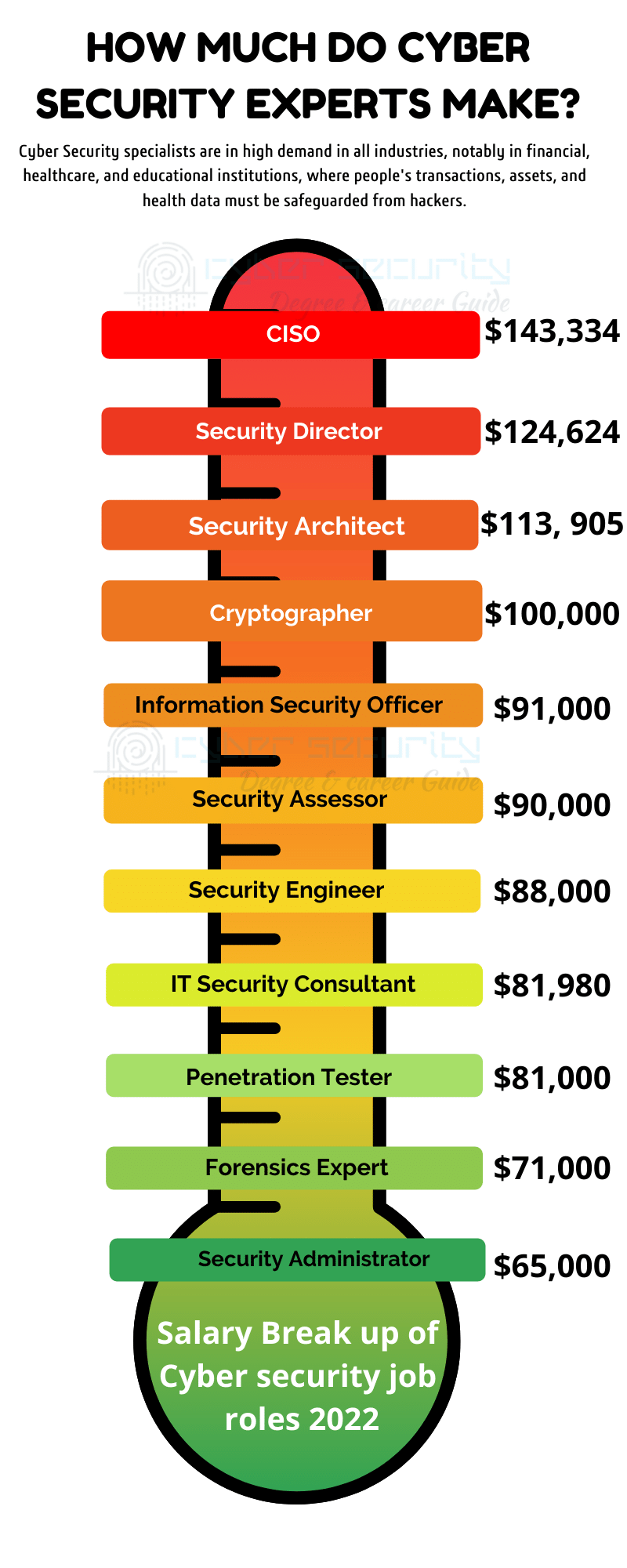The need for cybersecurity experts is growing exponentially in an increasingly digital world. According to a recent report, the global cybersecurity market is expected to grow at a compound annual rate of 11.8% and could be worth $270 billion by 2026. With so much money to make and such an in-demand skill set, it’s no surprise that more and more people are turning their sights on becoming cybersecurity experts. But how do you get started? This blog post will look at what it takes to become a good cybersecurity expert and how you can get started in the field.
Cyber security overview
To become a good cyber security expert, it is important to have a strong understanding of the basics of cyber security. This includes understanding how to protect computer networks and systems from unauthorized access or theft and responding to incidents when they occur.
A good cyber security expert will have a strong knowledge of both the technical aspects of cyber security, as well as the non-technical aspects. They will understand the importance of keeping up-to-date with the latest security threats and trends and will be able to communicate with both technical and non-technical staff effectively.
In addition to having strong technical skills, a good cybersecurity expert will also be able to think strategically about security issues. They will be able to develop plans and policies that can help prevent attacks from occurring and will be able to respond quickly and effectively if an attack does take place.
What do cyber security experts do?
Cyber security experts protect computer networks and data from unauthorized access or theft. They work with businesses and organizations to create security plans and implement security measures to safeguard information. In addition, they also conduct research to stay abreast of new threats and vulnerabilities.
How to become a cyber security expert
To become a cyber security expert, one must first understand computer security basics. Cyber security is the practice of protecting electronic information from unauthorized access or theft. It includes both hardware and software security measures.
One way to become a cyber security expert is to get a degree in computer science or a related field. Many colleges and universities offer programs in cyber security. Alternatively, there are many online courses available that can teach you the skills you need to know.
In addition to formal education, staying up-to-date on the latest cybersecurity news and trends is important. Reading blogs and articles written by experts in the field is a good way to do this. Additionally, attending conferences and networking with other professionals can help you gain insight into the industry.
The Different Types of Cyber Attacks
There are many types of cyber attacks, each requiring a different response. Here are some of the most common:
- Denial-of-service (DoS) attacks overload systems with traffic or requests, preventing legitimate users from accessing them. DoS attacks can be launched through a single computer or multiple computers (distributed denial-of-service, or DDoS).
- Malware: This malicious software can infect your computer, cause damage, steal data, or give attackers access to your system. Malware can be delivered through email attachments, downloads, or drive-by downloads (when you inadvertently install malware by visiting an infected website).
- Phishing: This type of social engineering attack in which attackers try to trick you into revealing sensitive information, such as passwords or credit card numbers. They may do this by sending fake emails or setting up fake websites that look legitimate.
- SQL injection: This attack takes advantage of vulnerabilities in web application code to inject malicious SQL code into the database. This can allow attackers to view, change, or delete data stored in the database.
- Cross-site scripting (XSS): This attack occurs when an attacker injects malicious code into a web page that is then executed by unsuspecting users who visit the page. The code can steal information or hijack the user’suser’s session.
The Importance of CyberSecurity
As the world becomes more and more digitized, the importance of cyber security increases. With so much of our lives and information now online, it’sit’s essential that we take steps to protect ourselves from cyber-attacks.
Becoming a good cyber security expert requires both knowledge and practical skills. It would help if you were up-to-date on the latest threats and vulnerabilities, and you also need to know how to identify and mitigate risks.
The stakes are high when it comes to cyber security. A successful attack can result in the loss of sensitive data, financial damages, and even reputational damage. That’sThat’s why businesses and organizations invest heavily in cybersecurity experts who can help them protect their systems and data.
If you’re interested in a career in cyber security, there are a few things you can do to get started:
- Educate yourself on the basics of cybersecurity.
- Gain practical experience by participating in online hacking forums or working on personal projects.
- Stay up-to-date on the latest news and developments in the field.
How to Protect Yourself from Cyber Attacks?
As the world becomes increasingly digitized, the risk of cyber attacks grows. Fortunately, there are steps you can take to protect yourself from these malicious activities.
First and foremost, you should always use strong passwords. A strong password is at least eight characters long and includes a mix of uppercase and lowercase letters, numbers, and symbols. Avoid using easily guessed words like your name or birthdate.
You should also enable two-factor authentication (2FA) whenever possible. 2FA adds an extra layer of security by requiring you to enter a code from your phone in addition to your password when logging in to an account. This makes it much harder for hackers to gain access to your accounts.
In addition, you should be careful about what information you share online. Don’tDon’t post personal information like your home address or date of birth on social media sites. Be cautious about clicking on links in emails or online – only click on links from trusted sources. And don’tdon’t download email attachments from people you don’tdon’t know.
Finally, keep your software up to date. Software updates often include security patches that can help protect your computer from new threats. So make sure you install all updates as soon as they’re available.
Following these simple tips can help keep yourself safe from cyber attacks.
Cyber Security Tools and Techniques
There are many tools and techniques that cyber security experts use to protect their systems and data. Some of the most common tools and techniques include:
- Firewalls: Firewalls are a barrier between your network and the outside world, keeping unauthorized users from accessing your data.
- Anti-virus software: This software helps to detect, prevent, and remove viruses and other malicious software from your computers and devices.
- Encryption: Encryption is a way of scrambling data so authorized users can only read it. This is often used to protect sensitive data, such as financial information or personal health records.
- Password protection: Using strong passwords is one of the simplest but most effective ways to protect your accounts and data. Be sure to use different passwords for different accounts, and don’tdon’t share them with anyone else.
- Security awareness training: educating yourself and others about cyber security risks and how to avoid them are one of the best ways to stay safe online.
Cyber Security Resources
Many resources are available to help you become a good cybersecurity expert. The US Department of Homeland Security provides a wealth of information on cyber security, including the National Cybersecurity and Communications Integration Center (NCCIC), which offers resources and tools for individuals and businesses.
The NIST Cybersecurity Framework is another excellent resource, guiding how to identify, protect, detect, respond to, and recover from cybersecurity threats. CISSP (Certified Information Systems Security Professional) is another great resource, providing certification and training in various aspects of information security.
Of course, only some resources can provide everything you need about cyber security. That’sThat’s why it’s important to supplement your reading with hands-on experience. There are many ways to get involved in the cybersecurity community, such as attending conferences and meetups, participating in online forums and mailing lists, or even starting your blog or podcast.
Training and Education
There are many ways to train and educate yourself to become a good cybersecurity expert. However, before you embark on any training, it is important to do your research and ensure that the training is reputable and will offer you the skills and knowledge you need to succeed in this field.
One way to train and educate yourself is to attend an accredited college or university that offers cybersecurity courses. This will allow you to learn from experienced professionals and gain the theoretical knowledge you need to succeed in this field. Alternatively, many online courses can provide you with the practical skills you need to protect businesses and individuals from cyber attacks.
Another way to gain experience and expertise in cyber security is to join a professional organization such as the International Information Systems Security Certification Consortium (ISC)2. This organization offers certification programmes that will teach you how to design, implement and manage security systems. In addition, they also offer networking opportunities with other professionals in the field, which can help you keep up-to-date with the latest trends and technologies.
Job Outlook
The job outlook for cyber security experts is very good. Cybersecurity is one of the fastest-growing fields in the IT industry, and there is a great demand for qualified experts. The average salary for a cyber security expert is $84,000 per year. Many job opportunities are available for qualified experts, and the demand is expected to grow.
Conclusion
We have discussed what it takes to become a good cybersecurity expert and provided you with useful tips on where to start. Becoming an expert requires dedication, hard work, and consistency. You need to stay ahead of cybersecurity trends to protect yourself and those around you from malicious activities. With the right tools, knowledge, and attitude towards safety, becoming a good cyber security expert can benefit your career prospects and society at large.










Leave a Reply